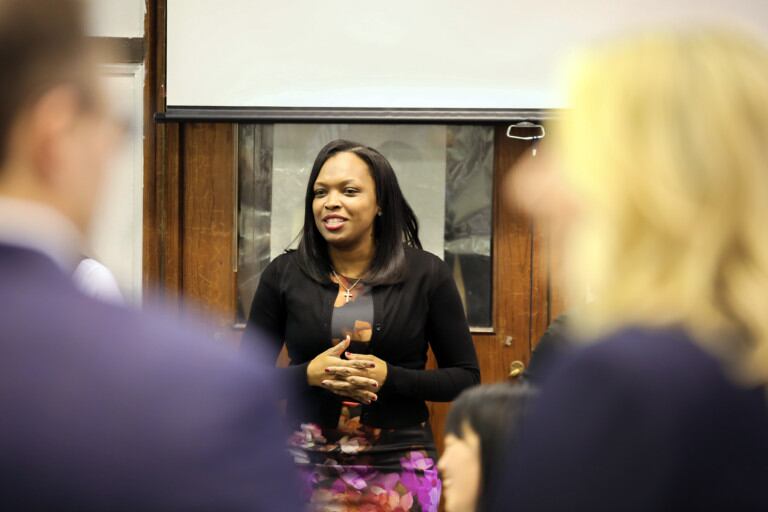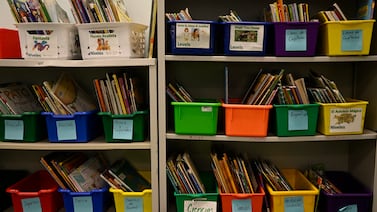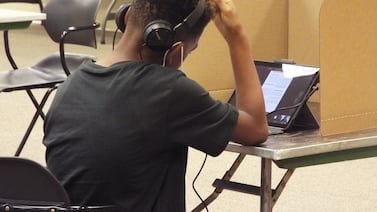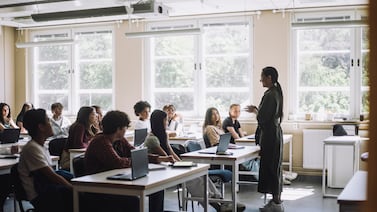Chicago will spend $125 million next school year to boost special education and low-enrollment schools and to add some of the nurses and social workers it agreed to in the latest union contract, officials said Tuesday.
The district, which offered a first draft of school-level budgets for the 2020-21 year on Tuesday, expects to present a balanced full-district budget this summer, thanks in part to about $205 million in federal emergency funding to help it face strain from the coronavirus pandemic and resulting school building closures. Chicago Public Schools must share some of that funding with private and charter schools, according to the federal government.
The spending plan presented Tuesday for individual campuses represents about 60% of the anticipated total district budget.
Still, schools chief Janice Jackson stressed the district cannot rule out the need to adjust its plan, as the longer-term effects of the coronavirus outbreak on state and district budgets become clearer.
“We are also cognizant of the reality we live in with COVID-19,” she said. “We will continue to monitor that.”
Asked Tuesday afternoon whether budget increases are prudent as revenue projections trend downward, Illinois Gov. J.B. Pritzker said he didn’t know yet how coronavirus-related revenue shortfalls would impact schools. He said he was working with legislators to see “whether we will be able to increase education funding at all. But I hope that we will.”
The preliminary school spending plan comes amid questions about whether Pritzker will allow school campuses to reopen in fall or whether remote learning will continue. The governor over the weekend acknowledged that extended fall closures were a possibility.
On Tuesday, Chicago Public Schools leaders said they compiled this year’s budget in response to a community engagement process, initiated by Mayor Lori Lightfoot, to reconsider how Chicago divides up its $6.2 billion operating budget, about $3.8 billion of which was earmarked for individual schools in 2019-20.
More than a third of the slated $125 million increase — $44 million — will go to 255 schools in the form of so-called “equity grants,” which have previously been directed to campuses with shrinking enrollment. The money is intended to help those schools maintain or even bulk up programs with the aim of attracting more families.
That approach has raised questions about whether Chicago should continue to throw lifelines to its most struggling schools, since that comes at a cost to other schools. According to district enrollment data, 145 campuses this school year were less than half full.
Officials said Tuesday that they were broadening the definition of the grants to include schools in communities with a high “hardship index,” a metric that factors in poverty, employment, education levels, and other data. Schools can use the additional money to hire reading specialists, for instance.
New proposed funding includes $97 million to increase special education services, $18 million to expand free full-day pre-kindergarten, $13 million to hire more nurses and social workers, and $5 million to fund college and career programs at neighborhood schools.
“The school budgets we are releasing today are key to providing every student in the district with a high-quality education,” Jackson said.
District leaders touted the special education boost as the largest single-year funding increase for special education in the district’s history. Chief Education Officer LaTanya McDade said the district tweaked its approach to budgeting for special education to give schools more flexibility and reduce the need for “mid-year corrections.” That includes giving schools more opportunities to “round up” staff positions — for instance, budgeting for two teachers or aides when school numbers call for 1.2 full-time positions.
Officials with the Chicago Teachers Union voiced disappointment Tuesday that the district had not briefed them on the school budgets ahead of time. In a statement, union President Jesse Sharkey criticized the lack of detail about how the district will address the COVID-19 crisis in school budgets. He said an increase in funding for nurses and social workers falls short of a goal to place those professionals in each school, as the union has advocated.
Before the coronavirus pandemic hit, Chicago was in the first stages of rethinking how it allocates its school budgets, part of a campaign promise by Lightfoot to revamp how the district doles out funds.
A committee of board members, district leaders, and union organizers held public meetings to solicit budget input earlier this year.
Their recommendations, also released Tuesday, suggest that in the long term the district must significantly change how it divvies up funds. In the short term, the district said it owes schools more transparency on how budget decisions are made, and will sharpen its definition of equity.
Jackson said the district incorporated two of the group’s six recommendations this spring. One was using school neighborhood’s “hardship indexes” instead of just student demographics to drive added funding to schools. The district also tried to give principals more of a say in crafting their school budgets.
Jackson said the district is still considering the remaining recommendations. She said the committee and residents who took part in listening sessions rallied around a need to advocate more aggressively for additional revenue from the state. She added she has no intention to move away from budgeting based on student enrollment, noting that slightly more than 50% of schools’ budgets are based purely on enrollment.
She added, “If the pie is not big enough for everybody, we will continue to have those debates.”
Principals are expected to receive their budgets on Tuesday afternoon.
Two principals joined Jackson in a virtual press conference to praise their latest budget allocations. Zaneta Abdul-Ahad at Hampton Fine and Performing Arts Elementary in Ashburn said she was thrilled to see additional funding for two new full-day pre-kindergarten classrooms — long on the wish list of the school community.
Victor Iturralde at Solorio Academy High School said students and families in the school’s Gage Park neighborhood face “tremendous economic challenges,” and he welcomes a new $100,000 “equity grant” the school received to provide added stability.
“Our students and community need a little help leveling the playing field,” he said.
Samantha Smylie contributed reporting.








